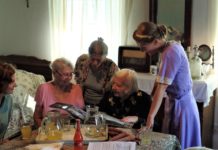The Roma diva, the unrivaled “Queen of Romani Music” Esma Redžepova, left a mark on contemporary Romani culture. Over her 60-year career, she gave 23,000 concerts, of which an impressive 2,000 were humanitarian performances. She grew up in a modest family, and the turning point in her life was when she entered a talent competition organized by Radio Skopje, which she won. Her performance was unprecedented – the first musical performance in the Romani language on Yugoslav radio. During her career, she released more than 20 music albums, acted in 6 films, sang at the most popular music festivals, and collaborated with the most esteemed regional and foreign musicians. She was not only a world-renowned musician but also a great humanitarian. Because of this, she was nominated for the Nobel Peace Prize twice. She showed her big heart by adopting 42 children, whom she raised with her husband Stevo Teodosievski, her great love and collaborator.
How she started singing
Even today, after her death, Esma Redžepova is called the unrivaled “Queen of Romani Music”. She was born on August 8, 1943, in Skopje, Macedonia, into a modest family as one of six children. Although life circumstances were difficult, her parents managed to educate all their children, believing that education would save them from poverty. In many interviews, she described her childhood as very hard but also as a great life lesson. There was no carefree upbringing for her; instead, she did various jobs like delivering milk, cleaning apartments, and dog-sitting. As a little girl, she encountered the burden of prejudices related to her Romani origin. As soon as she started first grade, they called her a “Gypsy,” and in the school desk, she sat alone because no one wanted to sit with her. However, this did not discourage her, and as a nine-year-old girl, she joined the school folklore ensemble, where her love for music was born. Just a few years later, she was invited to sing at a school talent competition for Radio Skopje, which she entered without her parents’ knowledge and where she won. It was the first time a song in the Romani language was broadcast on the radio. There, she caught the attention of Stevo Teodosievski, a musician, composer, and leader of a music ensemble. He asked her parents for permission to join them and perform on tour. This was not an easy task, as Esma grew up in a traditional Muslim family. Her parents were afraid that their daughter would sing in taverns and restaurants, which was considered inappropriate behavior for a young unmarried girl at the time. Nevertheless, Stevo managed to convince them, and Esma went to Belgrade to attend the Music Academy. Although her parents accepted the path she had chosen, her mother had a hard time dealing with her daughter’s emancipation, as she refused to marry early and become a housewife, which was expected of her. In her perseverance to sing and realize her dreams of one day becoming a world-famous artist, she was helped by living in the center of Skopje in a nationally diverse environment, more progressive views on life, and her persistence. During her studies, she joined Stevo’s orchestra, with which she performed all over the world. This was a life-changing moment, the beginning of her planetary music career. Stevo was her teacher, friend, and collaborator, and later, her life’s love.
During her career, she released more than 20 albums, acted in 6 films, sang at the most popular music festivals, collaborated with the most esteemed regional and foreign musicians and singers. She sang in Romani, Macedonian, Greek, and Turkish, and throughout her career, she built her personal musical style and recognizability. She was officially proclaimed the Queen of Romani Music in 1976 at the First Festival of Romani Music in India, when she received the recognition from Indira Gandhi, the then Indian Prime Minister. Since 2013, she held the title of National Artist of Macedonia. The same year, she also performed at the Eurovision Song Contest. Among her favorite songs was the song “Chaje Shukarije” (Little Girl), which she said she wrote at the age of nine.
Humanitarian Work
In addition to her astonishing music career, Esma Redžepova remained equally known for her humanitarian work. She held around 2,000 humanitarian concerts, co-founded a music school with her husband, helped the sick and the poor, and part of her humanitarian work was aimed at helping refugees. During the war in the former Yugoslavia, her house became a reception center for refugees from Kosovo and Bosnia, and in 2015, when the migration crisis broke out, she helped refugees from Syria and Iraq. It was her difficult childhood that shaped her humane character. She often spoke about receiving a scarf, gloves, and socks from the Red Cross at school and how she vowed at that moment that if she ever had anything, she would give to those who didn’t. Because of her big heart, selflessness, and years of humanitarian work, she was nominated for the Nobel Peace Prize twice.
Esma Redžepova also fought for the improvement of the Roma people’s position. She believed that people should be more educated about the Roma nation in order to better understand them because the Roma are cosmopolitans. She believed that her people deserved to be respected because they are noble and good.
Esma did not only advocate for the Roma people but altruistically helped all those in need, regardless of nationality, religion, and skin color. She was loved not only by the Roma but also by other ethnic groups whose position she fervently fought for. She also nurtured a strong patriotism towards Macedonia, which is why she was considered a national icon. She was officially proclaimed a cultural ambassador of Macedonia, and in 2007, she received a diplomatic passport.
Innovative, Secular, and Progressive
She married Stevo Teodosievski, who was 22 years older than the then twenty-year-old Esma. Until 1997, he was her partner, the person who managed her career, and her great love. He died after 40 years of their life together.
Throughout her life, she struggled with prejudices, not only about her Romani origin but also about women. She was criticized by the majority population and even some from within her community. Some Roma criticized Esma for not marrying a Roma, for collaborating with men, and for performing on stage. Through her actions, she broke down prejudices, both about the Romani community and gender prejudices. Esma was innovative, secular, and progressive, and she did not stop creating and performing even on the threshold of her seventh decade. She died on December 11 at the age of 74, but her songs still live on today.











